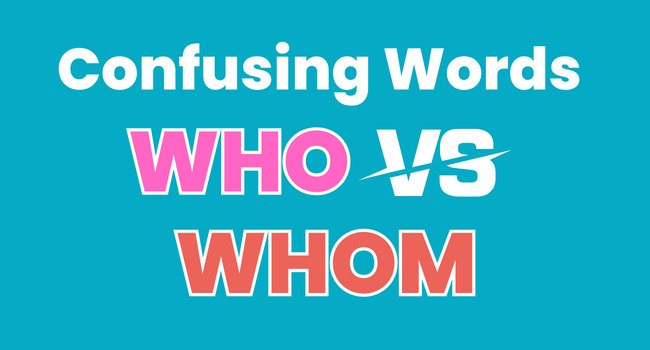
Today’s lesson is for both native English speakers and also English learners. We’re talking about the difference between who vs whom.
Who vs whom are often confused in English. They are both pronouns that refer to people. However, they have different meanings and uses. In casual conversation, people usually just say “who”. However, it’s important to know the difference, especially when you are writing an essay or a formal letter.
Who: Referring to the Subject (Subjective Pronoun)
“Who” is a pronoun that we use to refer to the subject of a sentence. “Who” refers to the person performing the action or being discussed.
Examples:
- Who is going to the party tonight?
- Who wants ice cream for dessert?
- Who thinks this is a bad idea?
- Do you know who won the game last night?
In these examples, who is used as the subject of the sentence.
If we answer these sentences, for example, “Who is going to the party tonight?” and the answer is “Jack is going to the party tonight,” Jack would be the subject of the sentence.
Whom: Referring to the Object (Objective Pronoun)
“Whom” is a pronoun that we use to refer to the object of a verb or preposition. “Whom” refers to the person receiving the action or being affected.
Examples:
- Whom did you invite to the party?
- To whom should I address this letter?
- Whom did you consult for legal advice?
- Whom should I contact for technical support?
In these examples, whom is used as the object of the verb or preposition.
If we answer these questions, for example, “Whom did you invite to the party?” and the answer is “I invited Jack,” “I” would be the subject, and “Jack” would be the object of the sentence.
Trick for Differentiating Who and Whom
A trick to remember the difference is with the he/him rule. Try rephrasing the sentence using personal pronouns like he or him.
If he fits, then who is the correct choice. If him fits, then whom is the correct choice.
Example questions:
- ____ is going to the party? (Would we say “He is going to the party,” or “Him is going to the party”?)
- We would say, “He is going to the party.” Therefore, the answer is: Who is going to the party?
Remember, if he fits, use who. If him fits, use whom.
Quiz: Fill in the Blanks with Who or Whom
- ____ should I ask for assistance?
- ____ is that person standing near the entrance?
- ____ wants to join me for a coffee break?
- For ____ did you prepare this surprise?
- Do you know ____ won the singing competition?
- ____ did you meet at the bookstore?
Remember to rephrase the question to find the right answer. Watch my video on YouTube for the answers to this quiz. If you have trouble with subjects and objects, check out my video on subjects versus objects, which will help you better understand this lesson.

Leave a Reply